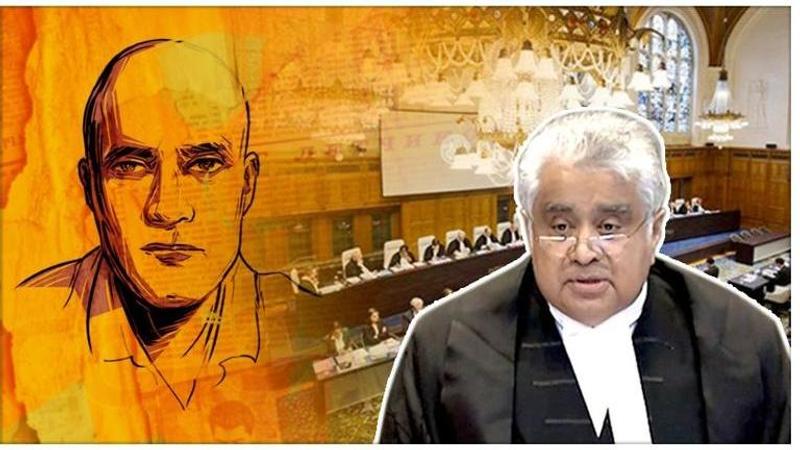Published 14:42 IST, July 18th 2019
Kulbhushan Jadhav Case: Harish Salve charged Re 1 to lead India to victory at ICJ, even as Pakistan spent crores
It was highlighted that Senior advocate Harish Salve charged Re 1 as his fee to represent India during the public hearing at the Hague while Pakistan spent more than Rs 20 crore on lawyers to prove that Jadhav was a spy

After India's big diplomatic victory in the Kulbhushan Jadhav case at the International Court of Justice (ICJ), it was highlighted that Senior advocate Harish Salve charged Re 1 c during the public hearing at the Hague while Pakistan spent more than Rs 20 crore on lawyers to prove that Jadhav was a spy.
On May 15, 2017, Former External Affairs Minister Sushma Swaraj while responding to a tweet questioning the expense India made in this case, she had revealed that Salve was charging merely Re 1 to represent India in the Hague. According to reports, Salve's charges Rs 30 lakh a day otherwise.
The Pakistan government had in its budget document presented in the National Assembly the last year said that it paid Rs 20 crore to UK-based barrister Khawar Qureshi, who is representing the country in the Hague. A Cambridge University law graduate, Qureshi is the youngest representing the case.
The ICJ's Verdict on Kulbhushan Jadhav
- The ICJ unanimously ruled that it has jurisdiction
- The ICJ ruled, with 15-1 votes that India's application is applicable
- The ICJ ruled, with 15-1 votes That Pakistan violated the Vienna Convention by not informing Jadhav of his rights
- The ICJ ruled, with 15-1 votes That Pakistan violated the Vienna Convention by not informing India of the detention of Kulbhushan Jadhav
- The ICJ ruled, with 15-1 votesThat Pakistan violated the Vienna Convention by depriving India the right to communicate with Jadhav
- The ICJ ruled, with 15-1 votes That Pakistan is obligated to provide consular access to India and inform Jadhav of his rights
- The ICJ ruled, with 15-1 votes That Pakistan must provide effective review and reconsideration of Jadhav's conviction and sentence
- The ICJ ruled, with 15-1 votes a stay of Jadhav's execution
What is the Kulbhushan Jadhav case?
Jadhav, 49, a retired navy officer was kidnapped by Pakistani authorities on March 3, 2016 from Iran, where he was carrying on his own business and was then shown to have been arrested in Baluchistan. India was informed about the arrest on March 25. He was sentenced to death alleging espionage on April 2017. Following the order by Pakistan's military court, India approached the ICJ and appealed that arrest of Jadhav and denial of consular access to him is in violation of provisions of the Vienna Convention on Consular Relations, 1963.
Since Justice Dalveer Bhandari, former Supreme Court of India judge, is on the 10-member ICJ Bench, Pakistan was allowed an ad hoc judge on the Bench — Tassaduq Hussain Jillani, a former Chief Justice of Pakistan. India is represented by former Solicitor General Harish Salve and External Affairs Ministry Joint Secretary (Pakistan-Afghanistan-Iran) Deepak Mittal, and Pakistan by Attorney General Anwar Mansoor Khan while Khawar Qureshi is legal counsel.
India's stand on the matter and India's argument
India claims breach of Article36(1)(b)of the Vienna Convention which obliged Pakistan to inform India of the arrest of an Indian national "without delay". It states that Pakistan is in breach of the provisions in the Vienna convention regarding consular access to Jadhav.
India's stand in the case states that the entire trial and sentence by Pakistan's military court,which was based on "confession taken under custody",without adequate legal representation. It is in brazen defiance of the rights and protections provided under the Vienna Convention and the International Law,including International Covenant on Civil and Political Rights (ICCPR).
What was Pakistan's claim?
Pakistan has asked ICJ to dismiss India's claim. It rejected India’s argument that the military courts don’t have officers with judicial expertise and experience. Pakistan attorney general said that judicial review system of Pakistan was robust and Jadhav can avail it if he chooses to do it. On India's claim over consular access Pakistan stated taht they provided consular access as it was a case of espionage. However its order of executing Jadhav was stayed by ICJ.
Pakistan's 'humanitarian gesture'
Pakistan allowed Kulbhushan Jadhav's family - his mother and sister - to meet him at the Pakistan Foreign Ministry in Islamabad for 45 minutes. The meeting took place in a controlled environment with a Pakistan official present and a glass screen separating Jadhav from his family. The family was subjected to humiliating treatment including the removal of their footwear and mangalsutras, and were made to wait an inordinately long time before exiting the premises in a move clearly meant at showcasing Pakistan's 'humanitarian' gesture.
India's appeal
- Annul Pakistan's military court's decision of sentencing Jadhav.
- Direct Pakistan to release Jadhav immediately and falicitate his passage to India.
If trial takes place in Pakistan:
- It should take place under ordinary law in civilian courts
- Jadhav's confession in custody must be excluded
- Full consular access be given and provisions for India to arrange for legal representations.
Updated 15:13 IST, July 18th 2019




